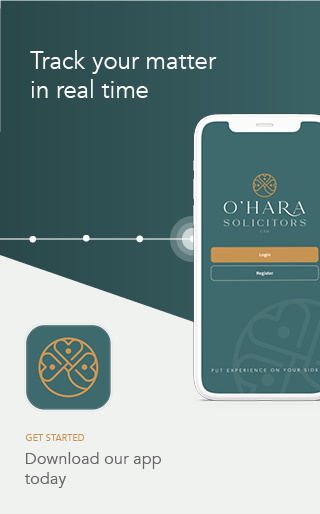Civil Partnership Dissolution
Civil Partnership Dissolution

Helping You Through Your Civil Partnership Dissolution.
Our legal team can help guide you through your relationship breakdown to make sure that your civil partnership doesn’t become uncivil throughout the process.
The breakdown of any relationship is never easy, however using O’Hara Solicitors Family Law department will help navigate you through this tough process so you can move forward in life.
Civil partnerships benefit from the same rights as married couples including pensions, inheritance and tax benefits; this is also the case for when a civil partnership ends, providing the same entitlements as a spouse who gets divorced.
The process to end a civil partnership is called a dissolution. This can be applied for through the court of law once your partnership has been at least a year. Before that, you can look at separation or annulment.
Alongside your dissolution, you can also apply for financial provision including, spousal maintenance, lump sums, property transfers and, if any children are involved, child maintenance orders.
Why Choose O’Hara Solicitors To Process Your Civil Partnership Dissolution?
Whatever you may be facing as a family, whatever make up or size your family is, was, or will be, we are here to listen to what you have to say and help with what you need. We will help take the strain from a very emotional issue, make the law easier to grasp and tailor our services for you and your circumstances.
- Proactive and dedicated family run firm
- Receive key updates on your matter via our O’Hara Solicitors App
- Over 45 years of legal experience
- Flexible if unable to come to the office.
We will make everything as easy as possible for you during this tough time, helping take any strain away, making your situation and options easier to grasp to help find a solution that works perfectly for you.
Frequently Asked Questions About Civil Partnership Dissolution
What is Civil Partnership Dissolution?
A dissolution is the legal process of a dissolution of a civil partnership by filing an application in a court of law. After a civil partnership has been legally dissolved, they are no longer legally married; however, depending on each case, there may be legal contracts set in place that must be adhered to such as child arrangement orders, child maintenance or spousal maintenance.
Can I Get A Dissolution?
To legally end a marriage or civil partnership, you will need to have been married or in the civil partnership for more than 12 months.
If you have not been married for at least 12 months, you can apply for a marriage annulment or complete a judicial separation application.
How Much Does A Dissolution Cost?
The cost of a dissolution depends on the method you choose and the complexity of the case.
Standard applicant court fees are £593 to process the divorce application within the court of law. When a solicitor is acting, the cost of preparing the paperwork, handling the application and proceedings starts at £750 +VAT.
Depending on the complexity of the issues within the dissolution where there are financial and/or child arrangements to resolve, the solicitors costs will vary from case to case and additional court proceedings/fees are required.
To see our full breakdown of costs please see our Family Price List here.
Can I Get Legal Aid?
We do not have a contract with the Legal Aid Agency and are therefore unable to offer legal aid to our clients.
Search here for a list of approved legal aid solicitors and law firms on the government’s legal aid website.
Who Pays The Legal Fees In A Dissolution?
When getting a civil dissolution, generally both sides will pay their own legal costs (see our family law price list for more information on costs.)
The person applying (the applicant) for the dissolution is responsible for the court fee. If it is a joint application, then applicant one will pay the court fees. The court fees are currently £593.
The applicant can ask for the respondent (the other party) to pay the court fees or share the cost. This is rarely done due to the necessity to make a separate application to the court to ask for a costs order.
The complexity of who pays what grows with the complexity of the case. Financial settlements and/or child arrangements can make a huge impact on your own personal cost. To see a full price list of family law pricing head here.
What Are The Grounds For A Civil Dissolution?
England and Wales operate a no-fault based divorce system for all divorce, dissolution and judicial separations. The landmark reform Divorce, Dissolution and Separation Act 2020 has been brought in with aims to make the process less acrimonious by introducing a ‘no fault’ procedure which means that you do not have to provide a reason for the breakdown of your marriage or civil partnership, just a statement that your marriage has irretrievably broken down. The new dissolution procedure is in force for applications that are issued from 6 April 2022.
How Long Does a Civil Dissolution Take?
The civil dissolution process will vary from case to case, however in England and Wales it take approximately six to eight months for the full dissolution process.
The length of a dissolution is due to two key elements within the process that require a waiting period.
Firstly, there is a 20 week cooling-off period after the court has issued the application before the conditional order can be granted.
Once the conditional order has been granted, there is the second waiting period of six weeks until you can apply for the final court order.
Other factors can also lengthen the process of a divorce, including and complicated financial matters, child arrangement matters, the lack of cooperation by one party or even delays at family court.
Can I Use The Same Solicitor As My Spouse?
You cannot use the same solicitor as your spouse as this would be a conflict of interest for the solicitor. You should both take independent legal advise from your own divorce solicitor so they can act in your best interests.
Will I Have To Go To Court?
Going to court during your divorce proceedings will depend entirely on the complexity of your unique case. For a fixed feed divorce, it is highly unlikely that you will need to go to court for the divorce proceedings.
If you reach a financial settlement by agreement, this can also be dealt with without court attendance.
If you are unable to reach and agreement despite trying a route of mediation or arbitration, it will be necessary to deal with this through the court process which will involve you attending court for hearings.
What Is A Conditional Order?
This is often referred to at the first stage of the divorce process. A Conditional order is a certificate that says the court does not see any reason why a couple cannot divorce or separate. This is applied for through court who will then consider your application and award the certificate when they see fit.
This however does not bring a marriage to an end. In the eyes of the law, the couple in question remains married until the final order has been granted, meaning the couple can still prevent the divorce form being finalised should feelings or situation change.
What Is A Final Order?
The final order is the last stage of the divorce which legally ends your marriage or civil partnership.
After the conditional order has been granted, a cooling off period of six seeks must be adhered to.
Before applying for the final order, it is advised that finalising the divorce including any financial settlements and/or child arrangements should take place due to the significant implications of the final order.
Once you have received your final order, you must keep the documentation safe as you may require it if you choose to revert to your maiden name or wish to remarry.
If for whatever reason, you do not apply for the final order within 12 months of the conditional order being granted, you will have to explain the reason for the delay in court.
What Is Mediation?
Mediation is a very effective process if you are struggling to come to an agreement on any issues arising from your divorce or separation. It involves both sides working together with a mediator to reach an agreement with a honest and open dialogue so all issues are remedied.
Mediation is usually a much quicker and more cost-effective process than a traditional solicitor led negotiation process or litigation. A mediator is trained to handle such negotiations in a calm and friendly environment which usually results in a more positive relationship to help move families forward.
We currently do not have any practising mediators at this time, however we can provide a contact of a professional mediator through our network.
What Is Arbitration?
Arbitration is a form of alternative dispute resolution that will resolve disputes outside the judiciary courts. In the case of a divorce, a third party known as the arbitrator will adopt the role of Judge, deciding on the issues they have been appointed to deal with after hearing and reviewing evidence from both parties as a Judge would at a final hearing, for instance financial and/or child arrangement matters.
When conducting an arbitration, the arbitrator must conform to and apply the law of England and Wales making their decision binding. This is known as an Award (financial matters) or a Determination (children matters). The decision can then be embodied into Court Order and submitted to the Courts for approval by a Judge.
This can make the process much quicker, more cost effective and give greater control to the case. Both parties must agree to engage in arbitration however, and there are additional costs involved to assign an arbitrator to your case.
For more information on this, please contact us here.
What If My Spouse Lacks Mental Capacity?
Under English law, a person’s mental capacity is judged according to the decision that needs to be made. The primary consideration here will be if the party with mental health concerns has the capacity to provide instructions and to agree to a divorce or financial settlement. Can they make an informed decision?
If there is any doubt on a person’s mental capacity, a doctor must make an assessment to determine if they are mentally fit to make the specific decisions they are facing.
If it is decided they do not have mental capacity, it is possible to progress the case if a representative is appointed to act on their behalf to make decisions in their best interests.
Are There Any Alternatives To A Civil Dissolution?
Many people going through separation don’t necessarily feel ready to go through the finality a civil dissolution proceeding brings. In this scenario, there are other options available including judicial separation, annulment or separation agreement.
We have children together, what happens next?
There are a number of options regarding child arrangements during a marriage or civil partnership breakdown – please see our Child Law page for more information.
How will family assets be split?
This will entirely depend on the uniqueness and complexity of your case. The staring point is always equality, but often takes a departure from that. A financial agreement is put in place to regulate how assets are split which can then be formalised by a court order. We cover more on divorce finances here.
Other Areas Of Family Law We Cover
DIVORCE
Our family team will be able to guide you through your divorce simply with empathy.
CIVIL DISSOLUTION
Our legal team will guide you through your civil partnership dissolution with care and tact.
SEPARATION
O’Hara Solicitors can work with you to provide the best separation plan possible.
FINANCIAL
We cover many areas of financial law including divorce finances, post-nuptial and pre-nuptial agreements.
CHILD LAW
Covering child law areas including arrangement orders, child maintenance and rights for grandparents.
DOMESTIC ABUSE
O’Hara Solicitors are able to help you with your domestic abuse issue legally and safely.





